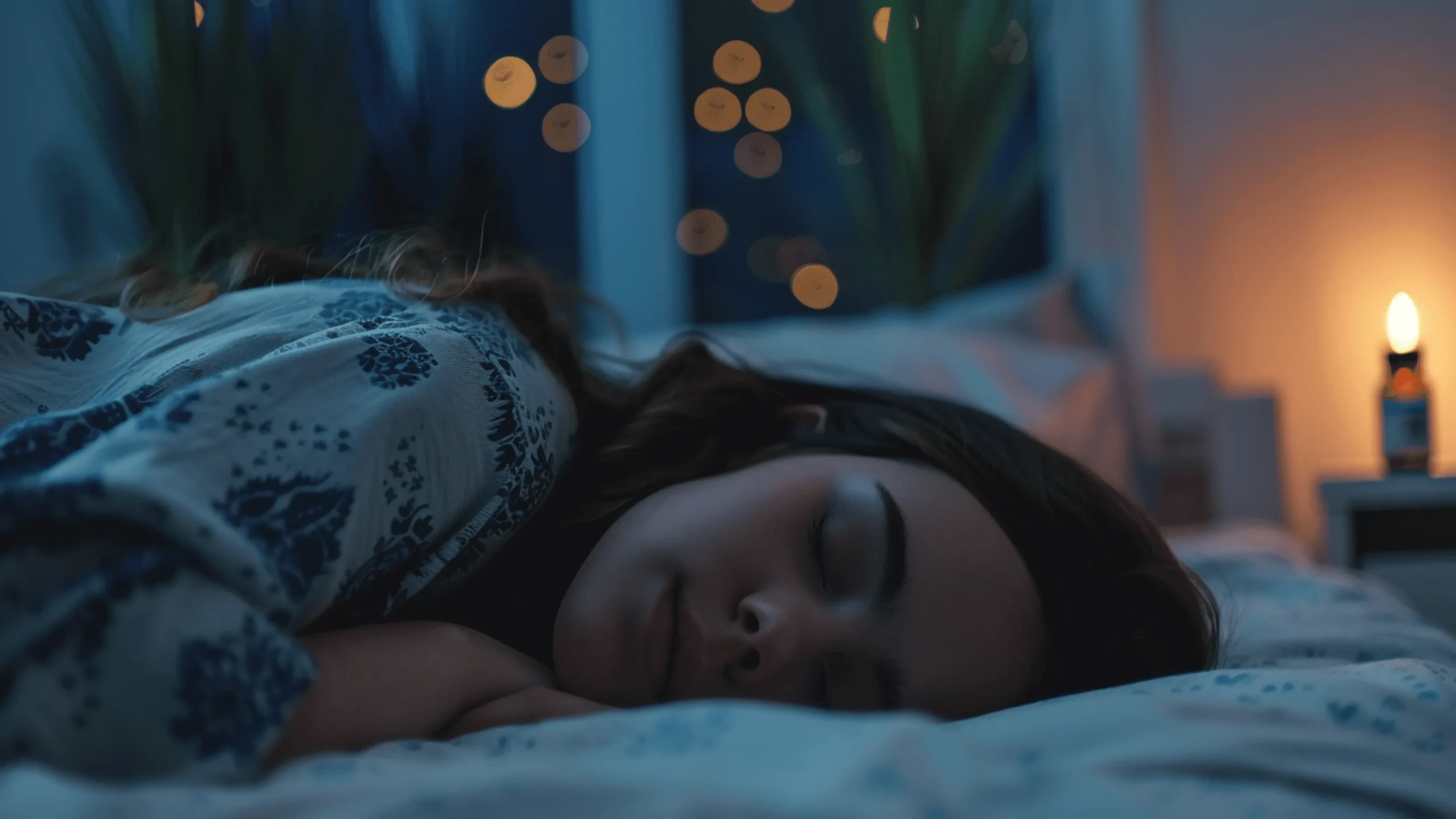CBD (or cannabidiol) is gaining attention for its potential to enhance sleep quality. CBD may help alleviate insomnia by addressing its causes. Although research is still early, a 2022 review indicates CBD, alone or with THC, could help relieve insomnia linked to external factors or related conditions.
More than 10% of the European population struggle with insomnia and other sleep disorders, seeking effective solutions beyond traditional medications and sleep aids, according to the European Insomnia Network.
CBD and insomnia are increasingly linked in health discussions as CBD is explored for its broad health applications, from reducing epileptic seizures to offering pain relief. Unlike THC, CBD does not induce a high, making it an attractive option for those seeking the therapeutic benefits of hemp without psychoactive effects.
For investors in the European CBD market, the link between CBD and insomnia represents a significant area of growth. The increasing consumer interest in natural sleep aids create a need for developing innovative CBD-based sleep solutions. By focusing on the benefits of CBD for sleep, businesses can enter a market eager for safe and effective alternatives to traditional sleep medications.
The endocannabinoid system and sleep
The endocannabinoid system (ECS) is important in understanding how CBD can influence sleep patterns. The ECS is a complex neurochemical network that regulates various bodily functions, including sleep. ECS is impacted by cannabinoids – active compounds found in the hemp plant. While the body naturally produces endocannabinoids, cannabinoids like CBD can modulate the ECS to promote better sleep.
Hypothalamus (a small area in the center of the brain) plays the critical role in the ECS as it has a rich concentration of cannabinoid receptors. The hypothalamus regulates the circadian rhythm that arranges peoples’ sleep-wake cycle. Research suggests that CBD’s interaction with the ECS and the hypothalamus could help regulate these 24-hour cycles, thus potentially improving sleep quality and consistency.
For anyone exploring CBD and insomnia, these insights are crucial. CBD’s potential to modulate sleep through the ECS offers a natural alternative to conventional sleep medications, aligning with a growing preference for these types of wellness solutions. Highlighting the scientific backing of CBD’s effects on sleep can attract consumers looking for effective sleep aids.
How can CBD benefit sleep?
CBD has been largely studied for its potential to indirectly enhance sleep quality. CBD can be a great option for those seeking relief from various sleep disorders such as insomnia and restless leg syndrome. Research indicates that CBD’s benefits for sleep come not only from its ability to ease conditions that directly affect sleep but also from its broader therapeutic properties.
CBD may facilitate relaxation by mitigating factors like anxiety and pain, which are common impediments to both falling asleep and maintaining uninterrupted sleep. This suggests that CBD’s influence on sleep may exist due to its impact on conditions known to disrupt sleep cycles. For those struggling with insomnia or similar sleep disorders, CBD offers a natural remedy by addressing some of the root causes of sleep disturbances rather than only sedating.

CBD and insomnia
CBD’s interaction with the hypothalamus makes it a valuable tool for individuals experiencing insomnia, particularly because it helps regulate stress responses that are often amplified during rest periods. Insomnia often comes from an overactive stress response that rises into periods meant for rest, and CBD can help modulate this by suppressing the cycle of stress hormone overactivation. This action helps to stabilize the sleep-wake rhythm.
Research focusing on the effects of CBD and insomnia has demonstrated that CBD is more effective in reducing symptoms of insomnia than delta-9 THC, the primary psychoactive component in cannabis that typically induces a “high.” This study highlights CBD’s potential as a non-psychoactive alternative that can offer significant relief from insomnia.
Positioning CBD products as effective sleep aids that work in harmony with the body’s natural processes can be tempting to consumers looking for safe and natural alternatives to pharmaceutical sleep aids.
CBD impact on circadian rhythm disorders
Circadian rhythm disorders, or sleep-wake cycle disorders, are conditions where an individual’s internal clock is out of sync with their environment, often intensified by changes in sleep habits due to factors like travel, shift work, medical conditions, aging, or genetics. CBD has shown promise in helping realign these disrupted sleep patterns, enhancing both the quality and duration of sleep. CBD aids in ensuring the body properly progresses through essential sleep stages, including REM sleep, without too many interruptions.
By facilitating a more regulated sleep cycle, CBD can help to achieve better sleep, improving overall health and functionality. Although benefits of CBD and insomnia are supported by many studies, further research is needed to fully understand and optimize CBD’s potential in treating circadian rhythm disorders.
Marketing CBD products as effective, natural solutions for sleep regulation can appeal to a broad audience, including those impacted by the challenges of shift work or jet lag, who are seeking alternatives to traditional sleep medications.
Using CBD to alleviate anxiety-related sleep issues
Many studies have positioned CBD as a potential treatment for anxiety disorders, which in turn, may improve sleep by decreasing anxiety levels. CBD’s capability to relieve anxiety makes it an excellent choice for calming the mind prior to sleep. CBD and insomnia are thus closely linked through CBD’s action on the endocannabinoid receptors in the limbic system, a critical brain area involved in regulating emotions and memory.
The limbic system’s balance is essential for emotional health and sleep quality. When this system is disrupted by stressors such as intrusive memories or heightened anxiety, it can lead to insomnia. CBD’s interaction with the endocannabinoid system (ECS) helps to restore balance by possibly repressing disruptive memories and easing anxiety, promoting a smoother transition into sleep.
For those suffering from CBD and insomnia, understanding the connection between anxiety and sleep disturbances is crucial. CBD brand owners have a unique opportunity to educate consumers on how CBD can serve as a natural, non-psychoactive alternative for improving sleep through anxiety reduction.
Can CBD help with restless leg syndrome?
Restless Leg Syndrome (RLS) is a neurological condition that significantly impacts sleep by causing an overwhelming need to move the legs, often accompanied by unpleasant feelings. CBD and insomnia are increasingly discussed together as early research indicates that CBD may help manage RLS by reducing the abnormal nerve firings responsible for involuntary muscle twitching, a common symptom of RLS.
For those exploring the potential of CBD and insomnia, particularly in relation to RLS, it is beneficial to know that the connection between CBD and improved symptoms of RLS has largely been supported by patients’ self-reported experiences. This anecdotal evidence suggests that CBD can enhance sleep quality for RLS sufferers by mitigating the urge to move and allowing for a more restful night. However, more scientific research is required to conclusively determine CBD’s efficacy in treating RLS. Such studies will help clarify the mechanisms by which CBD may alleviate the symptoms of RLS.
CBD for managing sleep disruptions caused by chronic pain
Studies increasingly affirm the pain-relief potential of CBD, marking it as a promising alternative for those seeking relief from chronic pain. CBD, applied topically, serves as an effective analgesic option for many individuals experiencing chronic pain which causes sleep disruptions like insomnia.
The application of CBD to areas experiencing pain has led to reported reductions in pain and inflammation, which are often significant disruptors of sleep. For people dealing with chronic pain conditions, CBD offers a way to manage their symptoms potentially without the side effects typically associated with traditional pain medications. Achieving effective pain control is essential for quality sleep, making CBD a valuable tool for those whose sleep is compromised by chronic pain.
Current research on CBD’s efficacy for insomnia
Research on CBD and insomnia, though still emerging, has been promising. A 2022 review highlighted CBD’s potential to alleviate insomnia symptoms, showing effectiveness when used alone or in combination with THC. CBD may enhance sleep by reducing anxiety levels, soothing chronic pain, and even improving symptoms of REM sleep behavior disorder, particularly in individuals with Parkinson’s disease. Additionally, it has been noted for reducing daytime sleepiness, further contributing to a healthier sleep cycle.
Effective ways to use CBD for better sleep
To assess the effectiveness of CBD and insomnia, it’s essential to first identify the underlying causes of poor sleep. Factors contributing to insomnia can range from mental health disorders like depression and anxiety to physical discomforts such as chronic pain. Other contributors include dietary habits like eating large meals close to bedtime, consuming too much caffeine, or environmental disruptions like noise or an uncomfortable bed. If insomnia comes from these external or related health conditions, CBD may offer significant relief by addressing the main causes of sleeplessness.
There are several methods to administer CBD, each with its own set of benefits and considerations, particularly when targeting CBD and insomnia. Options include vape concentrates, oils and tinctures, pills and capsules, and edibles like gummies. While vaping CBD may offer the quickest absorption into the system, it is less researched and may carry potential respiratory risks compared to other forms. Therefore, those considering CBD for sleep improvement should weigh the benefits against potential health risks.

Different types of CBD
Choosing the right CBD product for managing insomnia involves understanding the different types of CBD available and their specific aspects. These are three main types of CBD, each with distinct characteristics that may influence their effectiveness for improving sleep:
- Full-spectrum CBD: this includes all the natural compounds found in the hemp plant, including trace amounts of THC. In most parts of Europe, full-spectrum CBD is derived from hemp, which naturally contains low levels of THC. The presence of various cannabinoids and terpenes in full-spectrum CBD is believed to create an “entourage effect,” potentially enhancing the therapeutic benefits, including those affecting sleep.
- Broad-spectrum CBD: similar to full-spectrum, broad-spectrum CBD contains a wide range of cannabinoids and terpenes but without any THC. This makes it a preferred choice for those who want the benefits of the entourage effect without any exposure to THC.
- CBD Isolate: as the purest form of CBD, isolate contains only CBD and no other cannabinoids or plant compounds. It is ideal for individuals who need to avoid THC entirely or who are sensitive to other cannabinoids.
When exploring CBD and insomnia, the choice between these types can be overwhelming, especially with the market flooded with varying products and information. When advising your customers to select the best CBD for sleep, it is crucial to highlight not only the type of CBD but also the quality of the product. Providing clear, accurate, and educational information about the differences and benefits of each CBD type can help simplify the options for consumers.
Different types of CBD products for insomnia
CBD and insomnia are closely linked in discussions about natural sleep solutions, and the availability of CBD in diverse product formats enhances its accessibility for different preferences and needs. From edible gummies, similar to vitamin supplements, to sublingual oils, creams, lotions, capsules, tablets, skin patches, and a variety of food products like teas and chocolates, CBD offers a wide range of application methods. Each type of CBD products for insomnia provide unique benefits, for instance, CBD oils are particularly popular for sleep issues.
Potential side effects of using CBD
While CBD is generally regarded as a low-risk option for managing various conditions, including insomnia, it is essential to consult a healthcare professional before starting to use any CBD product, especially for individuals with pre-existing health conditions or those on medication.
A 2017 review on the safety of CBD use concluded that CBD is a safe treatment, with side effects being uncommon but can include:
- Fatigue;
- Diarrhea;
- Changes in weight and appetite;
- Dry mouth.
How often do people use CBD for sleep
CBD’s popularity as a sleep aid has been steadily increasing, particularly among European consumers seeking natural remedies for insomnia and other sleep disorders. Surveys indicate that a significant portion of CBD users in Europe turn to CBD products primarily to enhance sleep quality – this makes it one of the top reasons for CBD consumption on the continent.
The use of CBD for sleep, commonly known as CBD and insomnia treatment, is driven by its potential to interact with the body’s endocannabinoid system to promote relaxation and regulate sleep cycles. Many users report improved sleep patterns, including reduced time to fall asleep and fewer awakenings during the night. This has positioned CBD as a good alternative to traditional sleep medications, which can carry more significant side effects.
Educating consumers about the benefits of CBD for sleep, proved by user testimonials and scientific research, can further enhance product popularity.
Developing effective CBD products for sleep disorders
Many CBD products designed for improving sleep, e.g. CBD oil with CBN (cannabinoid which is known for its calming properties), incorporate other naturally soothing ingredients such as valerian root, chamomile, lavender, melatonin, 5-HTP, L-tryptophan, or magnesium. These components are chosen for their known sleep-enhancing properties, enhancing CBD’s effects on insomnia. The synergy between CBD and these ingredients can provide even better sleep management, potentially enhancing the overall efficacy of CBD and insomnia.

Final thoughts: is CBD a viable solution for insomnia?
Insomnia is a common issue that often leads individuals to explore various treatment options, including the use of CBD. While doctors generally advise for behavioral changes and, in some cases, prescription medications to manage insomnia, an increasing number of people are turning to CBD as a sleep aid. The interest in CBD and insomnia, commonly linked to its perceived safety and minimal side effects, highlights its appeal as a natural remedy for better sleep.
Experts are still piecing together why CBD and insomnia work, but recent research suggests it could enhance sleep quality by managing pain, anxiety, and daytime sleepiness – common reasons behind poor sleep.
In the context of the European CBD market, business representatives should focus on educating consumers about the potential benefits of CBD and insomnia while emphasizing the importance of professional guidance. Offering detailed, research-backed information and transparent product descriptions can help build trust and authority in the market. By aligning product offerings with consumer needs for safe and effective sleep solutions, businesses can tap into the growing demand for alternative CBD and insomnia’s treatments.
Featured Articles

Blog Home
No Content
